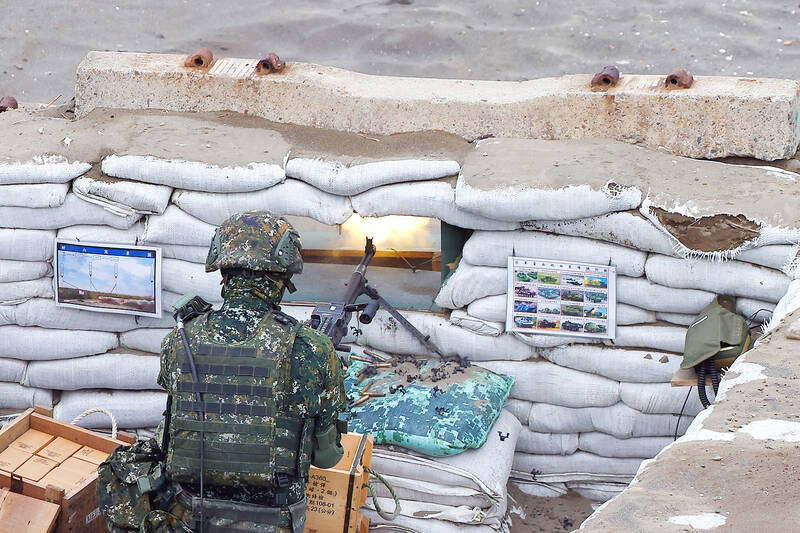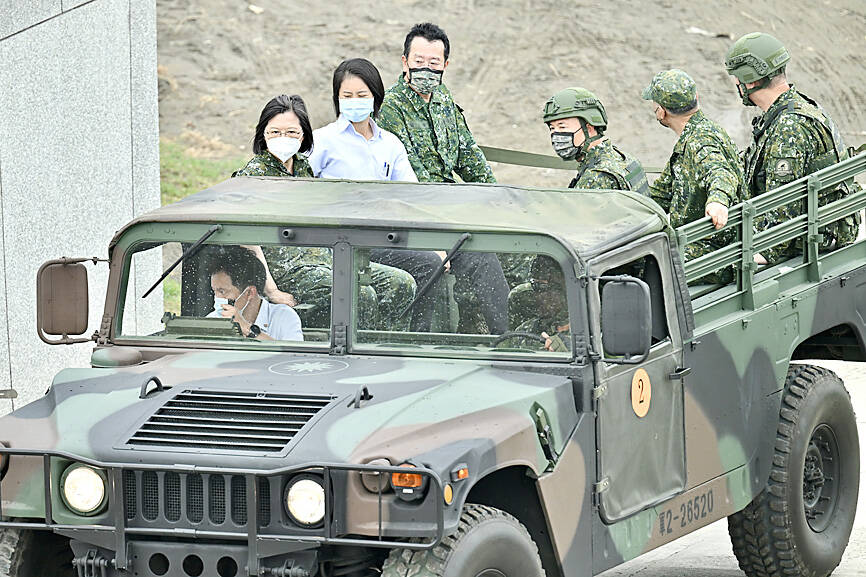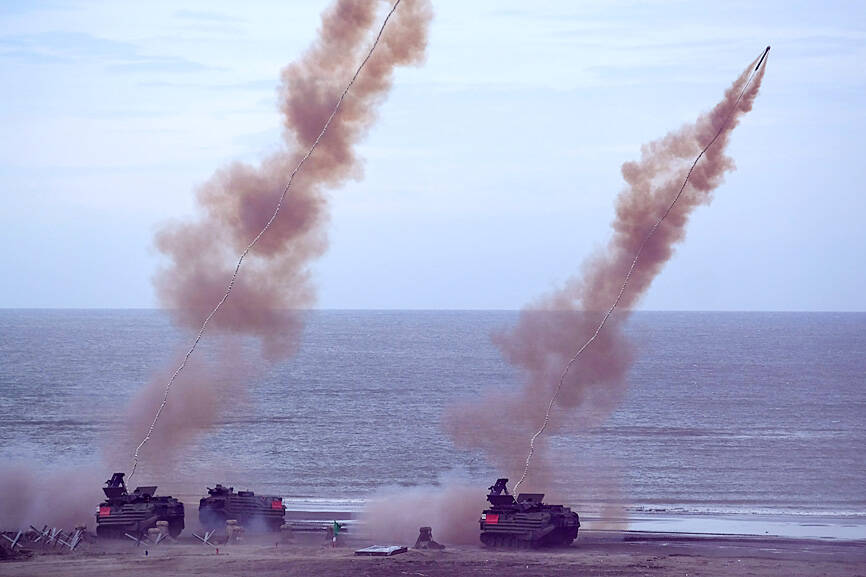The 39th annual Han Kuang military exercises reaffirm Taiwan’s resolute commitment to defending itself, President Tsai Ing-wen (蔡英文) said yesterday while observing the drills in New Taipei City’s Bali District (八里).
The fourth day of the live-fire phase of the exercises yesterday involved an anti-amphibious landing drill near the Port of Taipei in Bali, considered a critical site for repelling a Chinese attack.
Dressed in full military uniform and wearing a mask on her last Han Kuang inspection as president, Tsai boarded a Humvee, accompanied by Minister of National Defense Chiu Kuo-cheng (邱國正) and other senior military personnel, as they inspected the barricades and trenches on the beach, and temporary fortifications under Provincial Highway No. 61.

Photo: Ann Wang, Reuters
It was the second consecutive day that the president was inspecting the live-fire component of the annual drills, which started early on Monday and end today, despite testing positive for COVID-19 on Tuesday.
Tsai said she would never miss a Han Kuang exercise during her presidency, as it is of paramount importance to national security, adding that yesterday’s drills were the largest this year, which tested military cooperation with local police, firefighters and other organizations.
Taiwan’s defenses have taken pointers from the Ukraine-Russia war, utilizing local terrain to make its defensive positions more challenging to bombs or being fired upon, and bolstering overall defense capabilities on the coast, she said.

Photo: Tu Chien-jung, Taipei Times
While the drills demonstrated the nation’s ability to foil an attempt to secure a beachhead, the government cannot rest on its laurels and must continue to make plans that anticipate greater challenges in the future, she added.
In addition to bolstering the military’s overall defensive capabilities, the government should seek to integrate police, firefighters, local militias and other organizations into its defense plans to realize the goal of having the public take up arms in defense of the country, she said.
Tsai thanked the military on behalf of the public for its dedication to being the nation’s bulwark.

Photo: Sam Yeh, AFP
During a simulated beach invasion, troops from the Sixth Army Corps posed as “red” invading forces and “blue” defense ground troops, the Ministry of National Defense said.
The 30-minute drill began with the red invading troops making a forced landing on Bali beach in 20 AAV7 amphibious assault vehicles, the ministry said.
To repel the attack, the blue team deployed tanks and indigenous CM-32 Clouded Leopard armored vehicles, while also erecting barricades and digging trenches on the beach to slow the enemy’s advance.
Uncrewed aerial vehicles were also deployed to determine the enemy forces’ coordinates, which were then transmitted to a command center that mobilized ground forces in a counterstrike.
Meanwhile, a “blue” infantry soldier was seen armed with FGM-148 Javelin missiles in the trenches.
The portable anti-tank missiles have drawn wide attention because of their effective use by Ukraine to take out Russian tanks.
In the invasion simulation in Bali, defense troops also detonated explosives and smoke grenades to obscure the view of the invading forces and facilitate covert movements by the blue team, while the red team continued to advance on the beach under the cover of AH-64E and UH-60M attack helicopters.
As part of the Bali anti-amphibious landing drill, infantry troops stationed at a nearby temporary coastal fortification took up their designated positions in a 150m-long trench.
The fortification, which was set up under an elevated section of Provincial Highway No. 61, served as a second line of defense during the drill, allowing blue soldiers to eliminate members of the red invading forces who were advancing from the beach with tanks and artillery.
Some parts of the anti-landing drill were canceled due to strong winds from Typhoon Doksuri, including participation by the air force and navy, which were supposed to deploy fast mine-laying boats and the newly commissioned indigenous Yushan landing platform dock, a naval warship used to transport landing craft such as amphibious vehicles.
The ministry said that the Port of Taipei, Bali beach and Tamsui River (淡水河) estuary are strategic sites, comprising key defensive positions for fending off a potential seaborne invasion by the Chinese People’s Liberation Army.
Defending the area near the mouth of the Tamsui River has always been a priority for the military, because if it is breached by enemy forces, they could easily advance into the Greater Taipei area, the center of political and economic facilities, the ministry said.
Since they were first launched in 1984, the Han Kuang exercises have served as Taiwan’s major military drills, comprising live-fire exercises and computerized war games that are meant to test the nation’s combat readiness in the event of an invasion by China.
This year’s tabletop exercises were staged in May.

CHAOS: Iranians took to the streets playing celebratory music after reports of Khamenei’s death on Saturday, while mourners also gathered in Tehran yesterday Iranian Supreme Leader Ayatollah Ali Khamenei was killed in a major attack on Iran launched by Israel and the US, throwing the future of the Islamic republic into doubt and raising the risk of regional instability. Iranian state television and the state-run IRNA news agency announced the 86-year-old’s death early yesterday. US President Donald Trump said it gave Iranians their “greatest chance” to “take back” their country. The announcements came after a joint US and Israeli aerial bombardment that targeted Iranian military and governmental sites. Trump said the “heavy and pinpoint bombing” would continue through the week or as long

TRUST: The KMT said it respected the US’ timing and considerations, and hoped it would continue to honor its commitments to helping Taiwan bolster its defenses and deterrence US President Donald Trump is delaying a multibillion-dollar arms sale to Taiwan to ensure his visit to Beijing is successful, a New York Times report said. The weapons sales package has stalled in the US Department of State, the report said, citing US officials it did not identify. The White House has told agencies not to push forward ahead of Trump’s meeting with Chinese President Xi Jinping (習近平), it said. The two last month held a phone call to discuss trade and geopolitical flashpoints ahead of the summit. Xi raised the Taiwan issue and urged the US to handle arms sales to

BIG SPENDERS: Foreign investors bought the most Taiwan equities since 2005, signaling confidence that an AI boom would continue to benefit chipmakers Taiwan Semiconductor Manufacturing Co’s (TSMC, 台積電) market capitalization swelled to US$2 trillion for the first time following a 4.25 percent rally in its American depositary receipts (ADR) overnight, putting the world’s biggest contract chipmaker sixth on the list of the world’s biggest companies by market capitalization, just behind Amazon.com Inc. The site CompaniesMarketcap.com ranked TSMC ahead of Saudi Aramco and Meta Platforms Inc. The Taiwanese company’s ADRs on Tuesday surged to US$385.75 on the New York Stock Exchange, as strong demand for artificial intelligence (AI) applications led to chip supply constraints and boost revenue growth to record-breaking levels. Each TSMC ADR represents

State-run CPC Corp, Taiwan (CPC, 台灣中油) yesterday said that it had confirmed on Saturday night with its liquefied natural gas (LNG) and crude oil suppliers that shipments are proceeding as scheduled and that domestic supplies remain unaffected. The CPC yesterday announced the gasoline and diesel prices will rise by NT$0.2 and NT$0.4 per liter, respectively, starting Monday, citing Middle East tensions and blizzards in the eastern United States. CPC also iterated it has been reducing the proportion of crude oil imports from the Middle East and diversifying its supply sources in the past few years in response to geopolitical risks, expanding